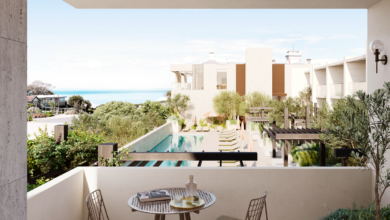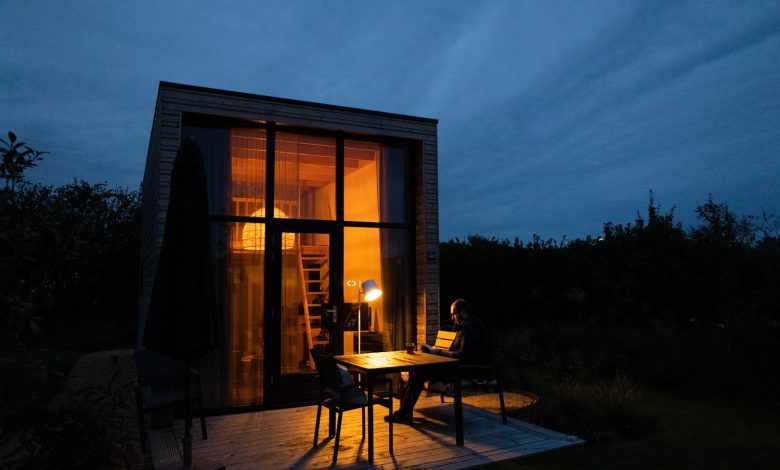
House in a skip: even tiny homes can’t address the privilege and insecurity of the housing market
Alice Elizabeth Wilson, University of York
When 28-year-old artist Harrison Marshall moved back to London after a spell abroad, he couldn’t find anywhere to live within his price bracket. So in March 2023 he moved into a converted skip. He had parked the yellow container on a patch of land in Bermondsey and kitted it out with a diminutive galley kitchen and a raised bed under a curved wooden roof.
Amid the affordable housing crisis, tiny houses have emerged as a last resort for those struggling to afford traditional homes. For many they offer a semblance of security and stability in an increasingly punitive housing and labour market.
At the same time, the luxury high-end custom-built tiny homes so popular on social media cater to a largely aspirational middle-class audience. My research shows that the costs involved in building these dwellings, not to mention finding where to put them, can be high. At the core of this movement is a complex interplay between privilege and insecurity.
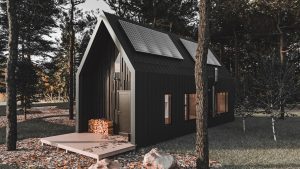
A creative solution
Marshall has explained that converting a skip was the only way he could afford to live in London. Skip House reportedly cost £4,000 to build, and he pays £50 per month to an arts charity in rental fees for the land.
He has a portaloo onsite, but no running water, so showers at the gym or at work. This is not many people’s idea of luxury, but it is a creative solution.
Many see the idea of a tiny house as a counter-cultural statement against consumerism and the housing market – and the culture of overwork required to finance these two things. Tiny houses can act as a beacon highlighting a simpler, more sustainable way of life.
That said, tiny house living is not entirely off-grid. Because it still requires connecting to very much on-grid neighbourhood resources – plumbed water, waste collection – it merges this anticonsumerist stance with new forms of commodified housing. Tiny houses thus make a political statement, without taking direct action.
Marshall himself has acknowledged as much. This kind of project straddles the boundaries of aspiration and necessity. Skip House does not demonstrate a way through the housing crisis and cost of living crisis, but nor are tiny houses claiming to be a silver bullet for our multiple crises.
High points and hurdles
The women I have interviewed speak about the serious challenge of finding up front cash or navigating private bank loans to fund their tiny homes. The average self-build tiny house costs around £25,000 with off-the-shelf options going for upwards of £75,000.
The next challenge is to find somewhere to put them. Marshall’s ability to find and come to an agreement with the arts charity that owns the land he is renting is made possible, in part, by what sociologists term his “social and cultural capital”, as a white, educated, man.
This is further made visible by the other factors that make Skip House possible: the fact that he can shower at the gym which he pays a membership for; that he has access and can pay for a laundrette; that he can come to some sort of agreement with the local council about special waste collection and portaloo use.
People who are financially or socially privileged benefit from access to resources, land and networks. This makes it easier to consider to a tiny house as an alternative mode of living.
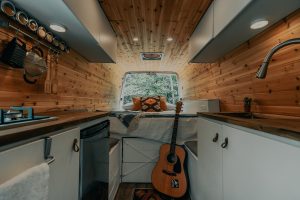
By contrast, those with limited means may find themselves turning to tiny houses out of sheer necessity. They might cobble together resources and support to build their own tiny houses and live in fear of being found out.
One person I spoke to was forced to live first in her car and then in a converted van to escape a domestic violence situation. If she had had the money to do something more comfortable and safe – like stay in a hotel or rent a place of her own – she would have. But it was not an option. Despite this, she says that she now loves her converted van and wouldn’t want to live any other way.
My recent research explores how many of the people who do live in tiny houses experience a huge amount of satisfaction and time and money savings. They report a sense of reconnecting with nature and community.
Another interviewee, Amy, was 37 when we spoke in 2020. She was living in a tiny house in Colorado at the time. She said:
It brought all of my values into alignment, I wanted a reduced carbon footprint. I wanted to spend my life doing rather than having. I wanted a space that was aesthetically beautiful, that I felt like I could stay in control of; like the cleaning wasn’t out of control, repair wasn’t going to bankrupt me.
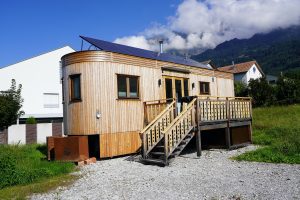
A larger question is what we can do to make this kind of life possible outside of the context of tiny houses. Access to land is a significant hurdle.Community land trusts are an excellent step in this direction. Their numbers have been growing in recent years, with 587 projects active in England and Wales and a further 7,100 related homes due to be delivered in the coming years.
The tiny house movement embodies a complex mixture of counter-cultural ideals, economic pragmatism and the entrenched sheltering of privilege. They are not a fix-all, but neither should they be dismissed out of hand. Co-ops and communitarian approaches to land occupancy have a long history of success in creating high-quality, affordable homes. Perhaps tiny houses will become a greater part of their successes in the future.![]()
Alice Elizabeth Wilson, PhD Candidate in Sociology, University of York
This article is republished from The Conversation under a Creative Commons license. Read the original article.

AccomNews is not affiliated with any government agency, body or political party. We are an independently owned, family-operated magazine.


